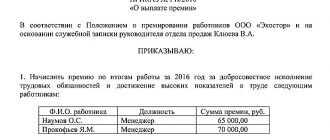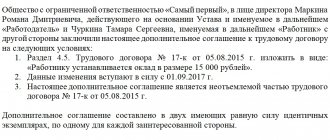Basic rights of an employee
When hired, a citizen enters into an employment contract with the employer. This is an agreement that reflects essential and additional terms. Without essential conditions, a contract cannot be recognized as legal, therefore their reflection in its text is mandatory. The essential conditions are:
- term;
- salary;
- functions performed by the employee;
- place of work.
The absence of additional conditions for legal consequences does not lead to the illegality of the transaction. But, as a rule, they are still included in the text, since they help to better understand the essence of the relationship between the parties. The basic rights and responsibilities of an employee are determined by Art. 21 Labor Code of the Russian Federation:
- conclusion, modification, termination of a contract with an employer;
- receipt of wages in full, other payments not included in it;
- workplace agreed upon by the terms of the agreement;
- vacation;
- reliable, up-to-date information regarding wage conditions;
- participation in trade unions, their creation in the organization;
- protection of labor rights;
- compulsory insurance;
- compensation for damage caused by the employer.
This list of rights (not closed) applies to employees of the organization.
History of the development of labor law in Russia
Over the course of many centuries, society has developed various spheres of human activity. According to the Marxist concept, it constantly moved from one formation to another.
The very first was the slave-owning formation, in which slaves were recognized as objects and their labor was obligatory and did not give rise to any legal relations between the employee and the employer.
It was replaced by a feudal formation, in which peasants and other working people were still recognized as objects of law, but the state was already, to some extent, protecting their interests from illegal attacks by feudal lords.
The next stage is a new time, when in Europe, after a series of bourgeois revolutions, new classes first emerged - the proletarians and the bourgeoisie, who had equal protection and freedom of economic activity, which entailed the active development of labor law. Thanks to the Napoleonic Code, it will separate from civil law and become an independent branch.
In legislative acts, the first norms of labor law are enshrined in the oldest documents of Kievan Rus - the “Russian Truth”, created by Prince Yaroslav the Wise. Basic norms concerned the social status of merchants.
So, for example, if a merchant became a victim of a shipwreck and lost all his goods, creditors had no right to claim compensation for losses. If a merchant drank away the goods that a foreign merchant had entrusted to him to transport, then he was awarded the highest punishment - flood and plunder. (Article 54 of Russkaya Pravda).
The Council Code of 1649 finally secured certain economic freedoms for peasants, who were already recognized as subjects of legal relations. They received the right to change landowners, move to the city to work, and leave for seasonal work.
The 1835 regulation “On relations between the owners of factory establishments and workers employed by them” was the first regulatory act regulating labor relations in Russia.
The regulation consisted of 10 articles and entrusted the employer with the creation of internal regulations. Nothing was mentioned in the regulation regarding the very content of these rules, and therefore the employer could act at his own discretion without interference from anyone.
At the very beginning of the establishment of Soviet power, labor relations were regulated.
These reforms had a political basis, and therefore were more declarative than practical.
Thus, an eight-hour working day was established, decent working conditions, social insurance, and labor protection were guaranteed.
During the period of war communism, the Labor Code of 1918 was published. All rules in it are mandatory in nature, which completely excludes the possibility of contractual relations between the administration and the worker or trade union.
The code laid down the principle of universal labor service. All aspects of work activity were strictly regulated.
So, for example, an employee did not have the right to hire himself for work; the labor exchange did this for him (Section VI “On remuneration for labor”).
Each occupation had a certain salary. Its size depended on the danger of working conditions, the severity of the work, the degree of training and experience to perform it (Article 58).
For the first time, the concept of overtime work was introduced as the only reason for additional payment of a worker.
Other rights included the right to sick leave - during illness, everyone received benefits through sickness funds and the right to vacation pay - during vacation, everyone was guaranteed vacation pay (Articles 106 and 107).
Each employee was required to have a work book, which was proof of his work experience. Her absence was an offence.
The Labor Code of 1922 already had fundamental differences from the previous one. Thus, he secured the right to conclude individual and collective labor contracts.
The Code significantly expanded workers' rights. They received the right to a guaranteed salary in accordance with the severity and amount of work performed, which could not be below the subsistence level.
He did not abolish compulsory labor service, but expanded the boundaries of possible non-participation in it.
Norms were also introduced to protect the rights of minors. The remuneration of a minor was to be the same as that of an adult worker for a full day of work.
The transition to developed socialism was consolidated by the new labor code of 1971.
He not only did not abolish labor service, but also introduced a new special type of it - labor mobilization. The wage system has been reformed.
Now wages should not be lower than the subsistence level, but the minimum amount established by the state, which reduced labor guarantees.
All enterprises, factories and factories were deprived of the right to set wages for workers. This function was assumed by the state represented by specially authorized bodies.
You might be interested in the “How Much Should We Work?” mind map, which explains how long a working day is
Or find out HERE how damages caused are recovered
Russian labor law received a new round of development after the collapse of the Soviet Union with the adoption of a new code in 2001.
This code already reflects the main global standards of labor law through the ratification of the ILO Convention on the Protection of Wages. The basic principles of labor are enshrined: equality, freedom of choice of work, inadmissibility of discrimination, forced labor, mandatory compensation for harm, fair working conditions and others.
The concept of wages has expanded significantly - various types of compensation and incentive payments have been added to it. Finally, labor law has reflected a move away from the outdated wage tariff system.
Government Resolution No. 583 finalized the transition to a new wage system.
According to the new code, employees have the right to suspend their work activities if the employer does not pay them wages within 15 days (Article 142 of the Labor Code of the Russian Federation).
The disadvantage of this code is the lack of legislative support for the wage indexation mechanism, which is a necessary element due to the constant change in prices for consumer goods.
Another point is a certain conflict associated with Art. 130 of the Labor Code and Art. 142 Federal Law “On Insolvency (Bankruptcy)”.
According to the article, a worker has the right to demand wages even if his employer goes bankrupt, but bankruptcy law says that if the debtor is incapacitated, all his debts are considered discharged.
Other regulatory documents regulating the sphere of labor relations are the laws “On Employment”, “On the Minimum Wage”, “The Law on Trade Unions, Their Rights and Guarantees of Operations”.
Although the current Labor Code aims to provide normative support for legal rights and freedoms in the labor sphere, it is not able to solve a number of current problems in this area.
One of the acute problems is discrimination against women. Very often, employers refuse to hire them due to the fact that they may soon go on maternity leave, or force those women who are pregnant to leave their place of work.
This is a one-sided form of discrimination, since men of childbearing age and those with children are not affected by these problems.
It is necessary to quickly ensure the protection of women's rights by laws, since this problem affects not only the labor sphere, but also the demography of the country as a whole, since women have to choose work or family.
Another problem is the age limit for hiring. Increasingly, employers are refusing to hire people over 35 years of age.
From a practical point of view, this is wrong, since people of this age already have some work experience, which, unfortunately, they cannot implement for the benefit of the country.
For the economic system to function successfully, it is necessary that the percentage of workers increase, not decrease.
Another common problem is informal employment.
There is a practice when the employee and the employer have only a verbal legal relationship and wages are paid based on the work performed. This is done to avoid taxes and fees.
Main responsibilities of the employee
If an employee is endowed with rights, then he also has responsibilities. They are:
- compliance with labor laws;
- compliance with labor safety standards;
- conscientious performance of labor duties;
- compliance with labor standards;
- careful handling of property owned by the employer.
In addition, the employee’s responsibility in the field of labor law is to comply with internal labor regulations.
Internal labor regulations
The protection of internal labor regulations is carried out by the employer. According to Art. 189 The Labor Code of the Russian Federation, internal labor regulations, is a local regulatory act that is subject to the Labor Code of the Russian Federation and other federal laws.
Internal labor regulations are a document that regulates the procedure for hiring and leaving the organization’s employees, their powers, responsibilities, rest and work schedules, incentives, penalties, as well as other issues related to labor relations.
As a rule, this document is an annex to a collective labor agreement, or less often to an individual employee’s contract. The provision that the employee has these rules when concluding a contract is not a mandatory provision. But every employee working at the enterprise must be familiar with the rules.
Ways to protect workers' rights
In order to protect and protect the rights of workers, the legislation has established several options for this action. The protection of labor rights is currently a pressing issue, since cases of their violation are not uncommon. The state, while protecting labor rights, implements this in the following ways:
- the employee's appeal to the labor dispute commission;
- application to the Labor Inspectorate;
- appeal to the Prosecutor's Office;
- lawsuit.
In addition, organizations such as trade unions can protect their rights and help in resolving a number of issues.
It is impossible to unambiguously answer the question of what the listed methods are for protecting the rights of employees in terms of performance. Each of them is effective, but subject to certain algorithms of action.
A labor dispute commission may not be present at every enterprise.
Although her order for the employer has the force of a writ of execution. In this case, it makes sense for the employee to seek protection from the Labor Inspectorate. This body was created to protect labor rights. You can contact the inspection in person, via mail or through the official website.
The court and the Prosecutor's Office are also called upon to protect the labor rights of the employee. You can contact the Prosecutor's Office in person by making an appointment with the prosecutor at the employer's location. The court must be approached through a statement of claim.
Author of the article
Article 21 of the Labor Code of the Russian Federation. Basic rights and responsibilities of an employee (current version)
5. The right to rest is enshrined in the Constitution of the Russian Federation and is included in Art. 21 among the basic labor rights of an employee. In labor legislation there is a significant group of norms that implement the right of citizens to rest when they enter into labor relations. Such standards provide for: the total duration of working hours and the duration of daily work; types of rest time, conditions for their provision; duration of vacations and the procedure for using them. The Code contains various rules that guarantee the exercise of the right to rest for every employee. It contains sections. IV “Working hours”, consisting of the chapter “General provisions” and the chapter “Working hours”, and section. V “Rest time”, establishing breaks in work, weekends and non-working holidays and vacations (see commentary on articles Chapters 15 - 19).
Of great importance for creating safe working conditions is the right assigned to workers to complete reliable information about working conditions, including the exercise of rights granted by legislation on special assessment of working conditions. According to Federal Law dated December 28, 2013 N 426-FZ “On Special Assessment of Working Conditions,” an employee has the right to: 1) be present during a special assessment of working conditions at his workplace; 2) contact the employer, his representative, the organization conducting a special assessment of working conditions, an expert of the organization conducting a special assessment of working conditions, for clarification on the issues of conducting a special assessment of working conditions at his workplace; 3) appeal the results of a special assessment of working conditions at his workplace.
6. The right to training and additional vocational education is closely related to the right of everyone to freely manage their ability to work, choose their type of activity and profession.
Agreements and collective agreements, taking into account the needs of organizations in personnel, provide for types of training, conditions for acquiring a specialty and advanced training. For persons who do not have a specialty, training is organized in the form of individual, team and course training. These same forms of training are used for retraining personnel. To train and retrain workers, an apprenticeship contract for education is concluded. Advanced training is carried out mainly through courses. The conditions for such training are determined by an additional agreement concluded between the employee and the employer.
In certain cases provided for by federal laws and other regulatory legal acts, the employer is obliged to improve the qualifications of employees. Such an obligation is provided if advanced training is a condition for the employee to perform certain types of activities. For example, training is mandatory when locomotive drivers switch to locomotives of a different type of traction (Order of the Ministry of Railways of Russia dated November 11, 1997 N 23C “On the procedure for conducting tests, issuing certificates for the right to drive a locomotive, multiple unit rolling stock on public tracks and assigning a qualification class drivers of locomotives and multi-unit rolling stock").
The main provisions related to training and additional professional education are contained in section. IX Code (see commentary to its articles).
7. The commented article names the right to association among the basic rights of an employee, including the right to create trade unions and join them to protect their rights and freedoms. The basic basis for enshrining this right in the Code is Art. 30 of the Constitution of the Russian Federation.
This right is exercised freely, without prior permission. Russian legislation on trade unions complies with the international legal act - ILO Convention No. 87 “On Freedom of Association and Protection of the Right to Organize” (1948), which provides that workers and entrepreneurs, without any distinction, have the right to create organizations of their choice without prior permission, as well as the right to join such organizations on the sole condition of subordination to the charters of these latter (Article 2).
8. One of the basic rights of an employee provided for by the Code is the right to participate in the management of the organization. This right is exercised in various forms. The employee exercises the right to manage the organization directly and through his representatives.
The workers directly approve the collective agreement at the general meeting of the organization, present demands to the employer in the event of a collective labor dispute, approve the decision to declare a strike at the meeting (conference) of the organization’s workers, and elect their representatives to the labor dispute commission.
Employees exercise the right to participate in the management of the organization through their representatives in all cases where the employer, in accordance with the Code, federal laws and other regulatory legal acts, and the collective agreement, must make a decision taking into account the opinions of employee representatives.
This opinion should be taken into account when terminating an employment contract at the initiative of the employer in accordance with paragraphs 2, 3 and 5 of Part 1 of Art. 81 of the Labor Code (see commentary to Article 373), when the employer approves internal labor regulations (see commentary to Article 190), etc.
Of particular importance is the employee’s right to participate in the management of the organization through collective bargaining and concluding a collective agreement.
A collective agreement makes it possible to resolve all major social and labor issues within the competence of the organization. Therefore, the Code in the commented article, while providing for the employee’s right to participate in the management of the organization, separately highlights the right to conduct collective bargaining and conclude collective agreements.
The right of employees to participate in the management of the organization is enshrined in all federal laws that determine the legal status of various legal entities. Participation in the management of the company by employee-shareholders is determined by the Law on Joint Stock Companies. Article 47 of this Law indicates that the general meeting of shareholders is the highest management body of a joint-stock company. His competence is very wide. Among the issues resolved by the general meeting of shareholders are the introduction of amendments and additions to the company's charter, reorganization of the company, election of members of the board of directors and early termination of their powers, formation of the executive body of the company.
The LLC Law contains a similar provision.
9. Unlike the previously effective Code, which included among the basic rights of an employee the possibility of judicial protection of their labor rights, the current Labor Code contains a different, broader wording: the right to protection by all means not prohibited by law. For the first time, the norms of labor legislation provide for self-defense of their labor rights by employees: the right to refuse to perform work not provided for in the employment contract, or work that directly threatens the life and health of the employee, as well as in other cases provided for by the Labor Code or other federal laws, the right to suspend work in case of delay in payment of wages for a period of more than 15 days (see commentary to Articles 379 and 142).
Judicial protection is of paramount importance. Its scope is currently expanding; more favorable conditions are provided for the speedy consideration of labor cases; Specialized courts—labour courts—are being created as an experiment.
One of the measures to facilitate and speed up the judicial protection of citizens' rights is the introduction of writ proceedings into the civil process and the issuance by a judge of a court order for the forced execution of demands based on documents. A court order is used, in particular, to collect wages accrued but not paid to an employee. Cases regarding the issuance of a court order have the right to be considered by a magistrate.
In addition to judicial protection, other methods of restoring violated rights are widely used. These methods include state supervision and control over compliance with labor laws. This supervision and control is carried out by the Federal Service for Labor and Employment represented by the Chief State Inspector, special authorized bodies - federal supervisors that monitor compliance with the rules for safe work in certain industries and at some industrial facilities, as well as federal executive authorities, executive authorities subjects of the Russian Federation and local government bodies exercising intradepartmental control in subordinate organizations.
State supervision over the accurate and uniform implementation of laws and other regulatory legal acts on labor is carried out by the Prosecutor General of the Russian Federation and his subordinate prosecutors in accordance with federal law (see commentary to Articles 353 - 369).
The protection of workers' labor rights is also carried out by trade unions, which create legal and technical labor inspectorates for this purpose. Trade union labor inspectorates have powers that allow them to effectively monitor compliance with labor legislation and other acts containing labor law norms (see commentary to Articles 370 - 378).
10. The list of basic rights of an employee set out in the commented article also provides for the right to resolve individual and collective labor disputes, including the right to strike. In this case, the Code repeats verbatim the provision enshrined in Art. 37 of the Constitution of the Russian Federation. This constitutional provision, on the one hand, is a guarantee of the labor rights of citizens, and on the other, it determines the mechanism for resolving labor disputes. The Code contains special chapters that regulate the common procedure for resolving individual and collective labor disputes (see commentary on articles Chapter 60 and 61 of the Labor Code). In ch. 61 “Consideration and resolution of collective labor disputes” provides for a mechanism for exercising the right to strike as a way to resolve a collective labor dispute. A strike is carried out if conciliation procedures do not lead to the resolution of a collective labor dispute or the employer evades conciliation procedures or does not comply with the agreement reached during the resolution of a collective labor dispute.
11. Separately in Art. 21 highlights the employee’s right to compensation for harm caused to him and compensation for moral damage. The Code, unlike the previously effective Labor Code, is not limited to the general rule on compensation for harm caused to employees, but provides for the financial liability of the employer both for the illegal deprivation of the employee’s opportunity to work and for damage caused to the employer’s property. For the first time, labor legislation provides for the employer's financial liability for delayed payment of wages (see commentary to Articles 234 - 236).
A novelty of the Labor Code is the establishment as one of the basic rights of an employee of the right to compensation for moral damage.
12. The rights of an employee and their implementation require him to respond - to fulfill the responsibilities that he assumed by concluding an employment contract with the employer. In the most general form, these obligations are formulated in Art. 21. These duties are fundamental for the application of the legal norms contained in the chapters of Part III of the Code: in Ch. 22 “Labor rationing”, ch. 30 “Labor discipline”, ch. 34 “Occupational Safety and Health Requirements”, etc. The responsibilities provided for in the Code are specified in laws and other regulatory legal acts, in particular in personnel regulations and internal labor regulations. Thus, the Law on the State Civil Service states that a civil servant, along with other duties, must keep state and other secrets protected by law, and also not disclose information that becomes known to him in connection with the performance of his duties that affects the private life, honor and dignity of citizens.
The issue of an employee’s labor responsibilities is most fully resolved in the internal labor regulations, in the employment contract, which determines the working hours and the performance of labor functions in compliance with certain rules dictated by the specifics of the activities of a particular organization.
One of the employee’s duties specified in Art. 21, - ensure the safety of the employer’s property (including the property of third parties located at the employer, if the employer is responsible for the safety of this property).
Fulfilling this responsibility also presupposes the safety of the property of other employees. Article 238 of the Labor Code establishes the employee’s financial liability for damage, both caused directly to the employer and incurred as a result of damage to other persons (see commentary to it).









